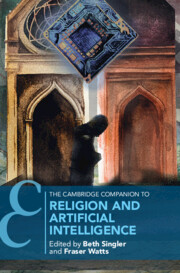Book contents
- The Cambridge Companion to Religion and Artificial Intelligence
- Cambridge Companions to Religion
- The Cambridge Companion to Religion and Artificial Intelligence
- Copyright page
- Contents
- Contributors
- Acknowledgements
- 1 Introduction
- 2 Steps towards Android Intelligence
- Part I Religions and AI
- Part II Social and Moral Issues
- 8 Transhumanism and Transcendence
- 9 The Eschatological Future of Artificial Intelligence
- 10 AI Ethics and Ethical AI
- 11 Black Theology × Artificial Intelligence
- 12 Imag(in)ing Human–Robot Relationships
- Part III Religious Studies
- Bibliography
- Index
- Cambridge Companions to Religion (continued from page ii)
- References
8 - Transhumanism and Transcendence
from Part II - Social and Moral Issues
Published online by Cambridge University Press: 20 November 2024
- The Cambridge Companion to Religion and Artificial Intelligence
- Cambridge Companions to Religion
- The Cambridge Companion to Religion and Artificial Intelligence
- Copyright page
- Contents
- Contributors
- Acknowledgements
- 1 Introduction
- 2 Steps towards Android Intelligence
- Part I Religions and AI
- Part II Social and Moral Issues
- 8 Transhumanism and Transcendence
- 9 The Eschatological Future of Artificial Intelligence
- 10 AI Ethics and Ethical AI
- 11 Black Theology × Artificial Intelligence
- 12 Imag(in)ing Human–Robot Relationships
- Part III Religious Studies
- Bibliography
- Index
- Cambridge Companions to Religion (continued from page ii)
- References
Summary
Technology has been an integral part of biological life since the inception of terrestrial life. Evolution is the process by which biological life seeks to transcend itself in pursuit of more robust life. This chapter examines transhumanism as the use of technological means to enhance human biological function. Transhumanists see human nature as a work in progress and suggest that by responsible use of science, technology and other rational means, we shall become beings with vastly greater capacities and unlimited potential. Transhumanism has religious implications.
Keywords
- Type
- Chapter
- Information
- The Cambridge Companion to Religion and Artificial Intelligence , pp. 131 - 147Publisher: Cambridge University PressPrint publication year: 2024

